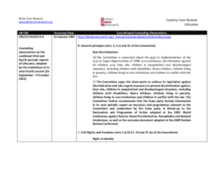Displaying 481 - 490 of 909
This issue of Innocenti's Adolescence Research Digest includes recent news, events, and other updates as well as links to some of the latest research on adolescents and violence, health, education, street-connected youth and more.
Esta investigación se aborda la necesidad de profundizar en la adquisición y consolidación de las competencias profesionales fundamentales para la acción socioeducativa grupal con familias acogedoras.
This research addresses the need to go deeper into the acquisition and consolidation of the core professional competences for running socio-educational groups with foster families.
The aim of this systematic review was to evaluate the evidence for interventions aimed at improving the quality of contact visits between parents and their children who are in out-of-home care.
The aim of this component of a preliminary cross-national study (Ireland and Catalonia) of care leavers' experience in the world of work is to explore how carers may influence the entry of young people in care into the world of work and how they may also influence the young people's progress in that world.
Compared to children in other placements, there is much less known about the characteristics and needs of children in the UK who are returned to their birth parents with a care order still in place.
This study investigated the widely-used but under-researched program for training resource parents (i.e., foster, adoptive, or kinship parents) known as preservice PRIDE (Parent Resources for Information, Development and Education). The sample consisted of 174 participants in Ontario, Canada.
This paper examines existing knowledge on raising adolescents in east and southern African countries, including Kenya, Malawi, Mozambique, South Africa, Tanzania and Zimbabwe. According to the report, and within the context of these regions, parenting is understood to be handled through extended community and family networks.
This country care review includes the Concluding Observations for the Committee on the Rights of the Child and the Committee on the Rights of Persons with Disabilities.
El objetivo de este estudio fue determinar los factores asociados al riesgo de negligencia en el cuidado del hijo durante el primer año de crianza en madres adolescentes y adultas.



